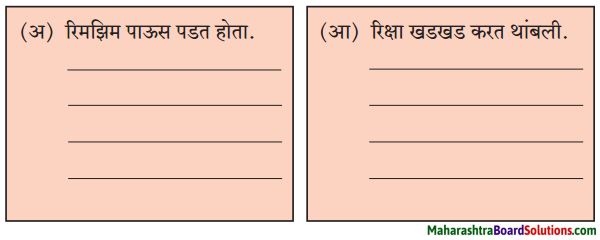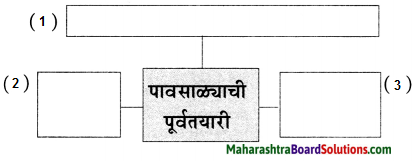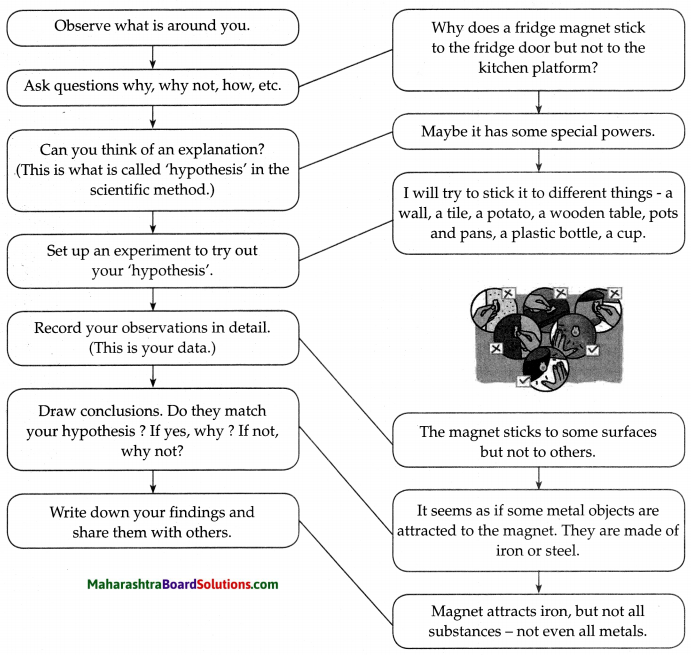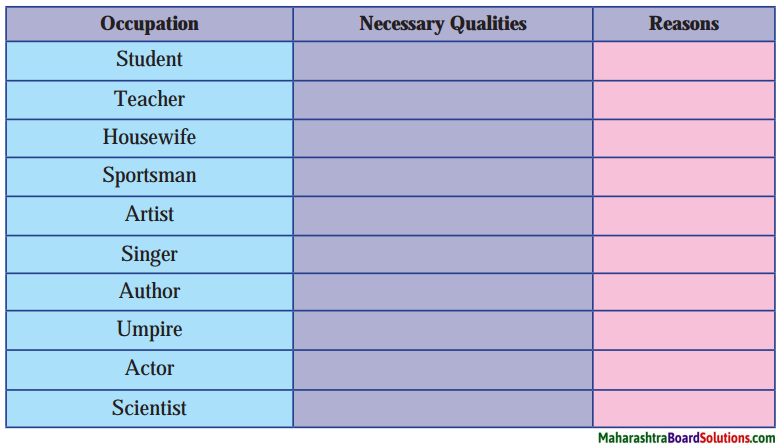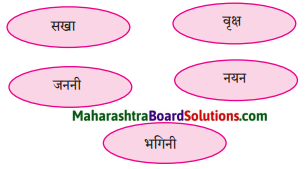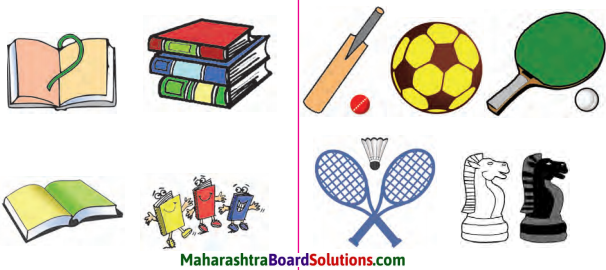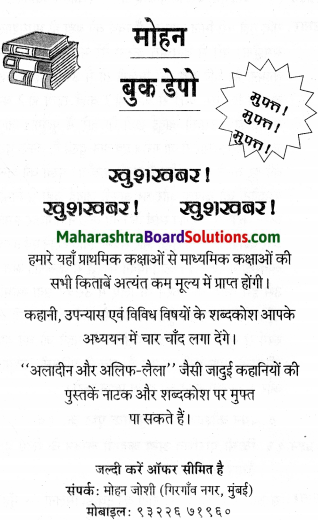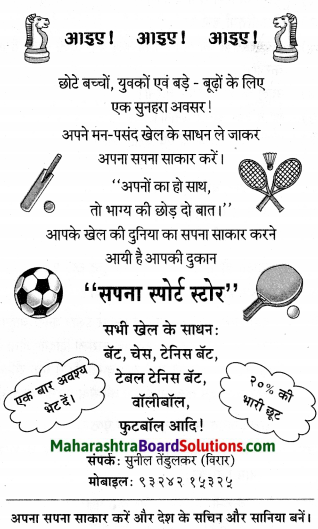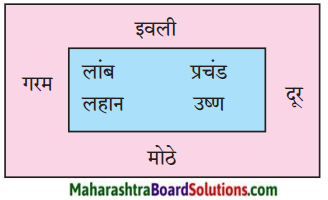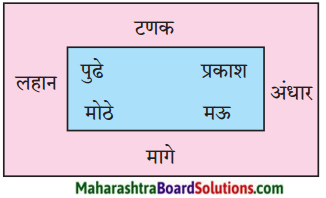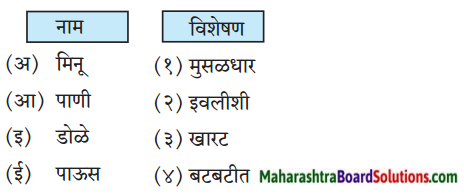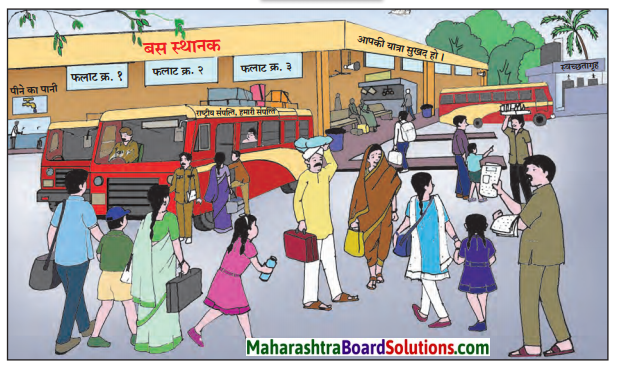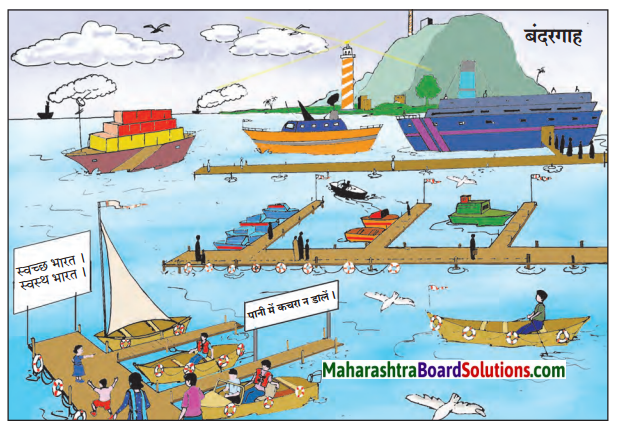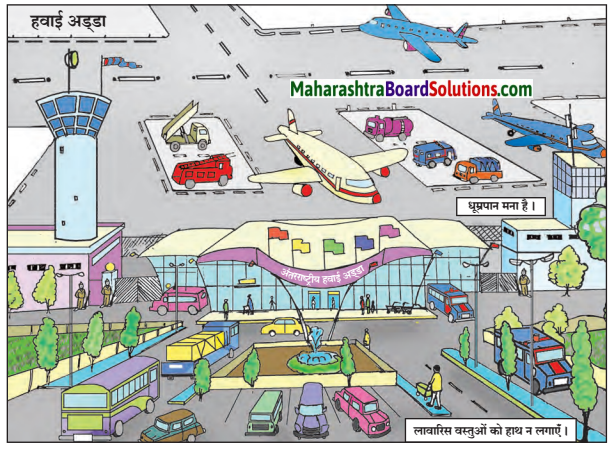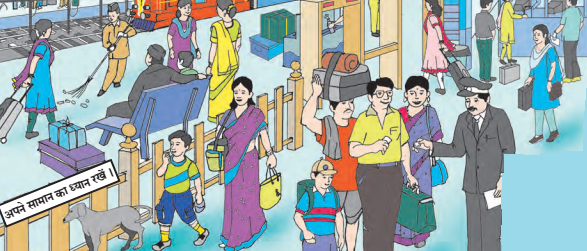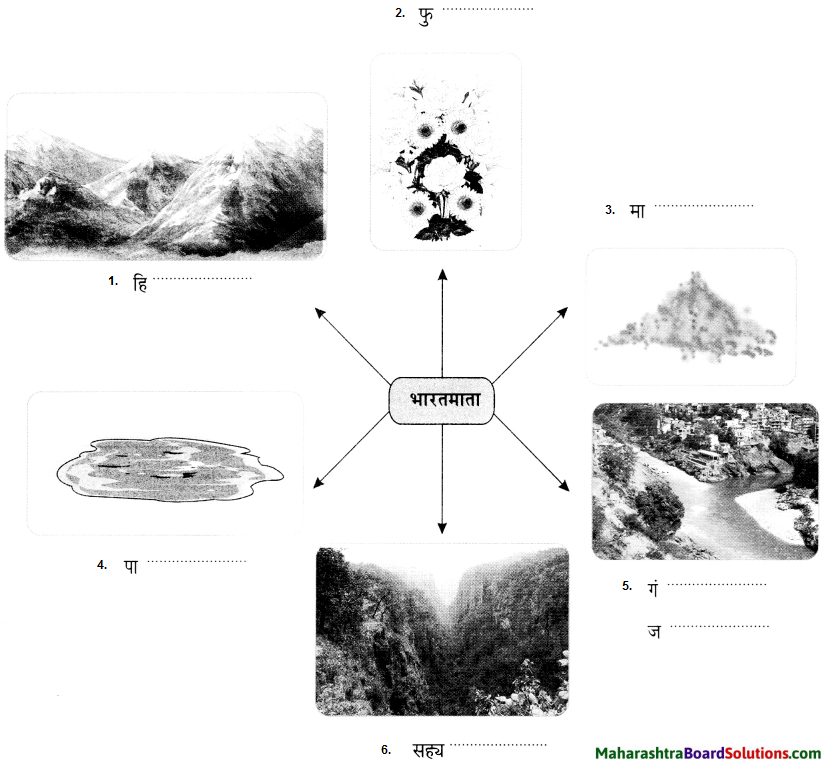Balbharti Maharashtra State Board Class 6 Hindi Solutions Sulabhbharati Chapter 6 मेरा अहोभाग्य Notes, Textbook Exercise Important Questions and Answers.
Maharashtra State Board Class 6 Hindi Solutions Chapter 6 मेरा अहोभाग्य
Hindi Sulabhbharti Class 6 Solutions Chapter 6 मेरा अहोभाग्य Textbook Questions and Answers
नाम तुम्हारे:
चित्र देखकर उचित सर्वनाम में लिखो:

(तू, मैं, वह, यह, क्या, जैसा-वैसा, अपने-आप)
Answer:
- मैं
- तू
- यह
- अपने-आप
- वह
- जैसा-वैसा
- क्या?
जरा सोचो ………बताओ:
यदि मैं पुस्तक होता/होती तो …….
Answer:
यदि मैं पुस्तक होता…..
स्वयं पुस्तक होना अपने आप में एक बहुत बड़ी बात है। यदि मैं पुस्तक होता तो लोगों को और दुनिया को ज्ञान देने के मेरे कर्तव्य को मैं भली-भाँति निभाता। मैं विद्यार्थियों के बौद्धिक, शारीरिक और सर्वांगीण विकास का ध्यान रखते हुए उन्हें योग्य मार्गदर्शन करता। सारे संसार को जीवन उपयोगी और मूल्यवान विचार प्रदान करता। पूरी मानव जाति के लिए उनके भले के लिए अपना पूरा जीवन त्याग देता।
![]()
भाषा की ओर:
निम्नलिखित शब्दों के लिंग और वचन बदलकर लिखिए:
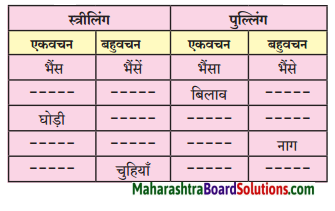
Answer:
(१) बिल्ली, बिल्लियाँ, बिल्ले
(२) घोड़ियाँ, घोड़ा, घोड़े
(३) नागिन, नागिनें, नाग
(४) चुहिया, चूहा, चूहे
सुनो तो जराः
दैनिक समाचार सुनेंगे और मुख्य समाचार को फलक पर लिखकर कक्षा में सुनाएँगे:
Answer:
प्रश्न का उत्तर छात्र स्वयं तैयार करेंगे।
बताओ तो सही:
अपने मनपसंद व्यक्ति का साक्षात्कार लेने हेतु कोई पाँच प्रश्न लिखिए:
Answer:
मनपसंद व्यक्ति – प्रधानमंत्री श्री नरेंद्र मोदी जी
- महोदय, आपका पूरा नाम क्या है?
- आपका जन्म कब और कहाँ हुआ?
- आप अपने जीवन में क्या बनना चाहते थे?
- आप अपने देश के लिए और क्या करना चाहेंगे?
- आपके विचार से देश के सामने खड़ी सबसे बड़ी समस्या कौन-सी है?
![]()
वाचन जगत से:
संत तुकाराम के अभंग पढ़ेंगे और गायेंगे:
Answer:
“तुका राम बहुत मीठा रे, भर राखें शरीर।
तनकी करूं नावरि, उतारूँ पैल तीर।।”
मेरी कलम से:
अपने परिवार से संबंधित कोई संस्मरण लिखिए:
(संस्मरण-लेखन / अनुच्छेद-लेखन)
Answer:
मनुष्य के जीवन से उसके कई संस्मरण जुड़े होते हैं। गतवर्ष मैं अपने परिवार के साथ अहमदाबाद गया था। वहाँ जाकर मुझे हमारे राष्ट्रपिता महात्मा गांधी का साबरमती आश्रम देखने का सौभाग्य प्राप्त हुआ। उनके स्वतंत्रता संग्राम योगदान के कई चित्र तथा उनकी लिखी किताबें और वहाँ का विस्तृत पुस्तकालय देखकर मानो मैं कहीं खो गया। घर के सभी लोग मुझे पूरे आश्रम में ढूँढ रहे थे। मैं मानो गांधी जी द्वारा लिखित उन किताबों में कहीं खो गया था। काफ़ी देर बाद पिताजी ने वहाँ आकर मुझे आवाज़ दी। मैंने देखा काफ़ी समय बीत चुका था। मैं करीब २ घंटे उस पुस्तकालय में मानो खो गया था। साबरमती आश्रम की यह भेंट मुझे भुलाए नहीं भूलती। यह मेरे जीवन का सबसे सुंदर संस्मरण है।
एक वाक्य में उत्तर लिखो:
Question 1.
साहित्यिक कार्यक्रम कहाँ होने वाला था?
Answer:
साहित्यिक कार्यक्रम शांति निकेतन में होने वाला था।
Question 2.
गुरुदेव की कहानियों में कौन-सी मनोवृत्ति के दर्शन होते हैं?
Answer:
गुरुदेव की कहानियों में ग्रामीण जनता की मनोवृत्ति के दर्शन होते हैं।
![]()
Question 3.
संस्मरण में किस कहानी का उल्लेख किया गया है?
Answer:
संस्मरण में ‘काबुलीवाला’ कहानी का उल्लेख किया गया है।
Question 4.
लेखक आनंद विभोर क्यों हुए?
Answer:
लेखक आनंद विभोर इसलिए हुए क्योंकि लेखक जिस कमरे मे ठहरे थे, उसी कमरे में गुरुदेव रवींद्रनाथ ठाकुर ने ‘गीतांजली’ का अधिकांश भाग उसके बरामदे में लिखा था।
Question 5.
हिंदी वालों के दल को कहाँ ठहराया गया था?
Answer:
हिंदी वालों के दल को शांति निकेतन के सुंदर अतिथि-भवन में ठहराया गया था।
स्वयं अध्ययन:
महान विभूतियों की सूची बनाकर उनके कार्यों का उल्लेख करते हुए निबंध लिखिए:
Answer:
- महात्मा गांधी
- सुभाषचंद्र बोस
- लोकमान्य तिलक
- लालबहादुर शास्त्री
- सरदार वल्लभभाई पटेल
- पंडित जवाहरलाल नेहरू
देश के महापुरुष – देश की महान विभूतियों का योगदान
हमारे देश में प्राचीन काल में देश को स्वतंत्र कराने के लिए कई वीरों ने अपने प्राणों का बलिदान कर दिया। जिनके बलिदान के कारण ही आज हम खुली हवा में साँस ले रहे हैं। महात्मा गांधीजी ने लोगों को सत्य और अहिंसा की सीख दी तथा “करो या मरों” इस नारे के माध्यम से लोगों का हौसला बढ़ाया। अपनी स्वतंत्रता हासिल करने के लिए लोकमान्य तिलक ने ब्रिटिश सरकार को बताया कि ‘स्वराज्य मेरा जन्मसिद्ध अधिकार है, उसे मैं लेकर ही रहूँगा।’ उनकी इस घोषणा ने लोगों में सराहनीय जोश का संचार किया। सुभाषचंद्र बोस ने ‘तुम मुझे खून दो, मैं तुम्हें आजादी दूंगा।’ यह कहते हुए सभी युवकों और देशवासियों को संगठित होने का संदेश दिया।
लालबहादुर शास्त्री ने देशवासियों को स्वतंत्रता का महत्त्व समझाया और अंग्रेजों को देश से उखाड़ फेंकने के लिए लोगों में स्वतंत्रता की अलख जगाई। इस प्रकार देश के कई महापुरुषों ने स्वतंत्रता आंदोलन में अपना सहयोग दिया। इन सभी महापुरुषों के योगदान के कारण ही हमारा भारत देश १५ अगस्त, १९४७ को स्वतंत्र हो गया।
![]()
सदैव ध्यान में रखो:
उल्लेखनीय कार्य ही व्यक्ति को महान बनाते हैं।
Answer:
इस संसार में प्रतिदिन कई लोग जन्म लेते हैं, तो कई लोगों की मृत्यु होती है। संसार सभी को याद नहीं रखता। जो व्यक्ति अपने कार्य-काल में समाज, देश एवं अपनी संस्कृति के लिए कुछ अतुलनीय कार्य करता है, उसी व्यक्ति को संसार याद रखता है। व्यक्ति अपने धन, संपत्ति एवं पद की प्रतिष्ठा से महान नहीं बनता, बल्कि अपने उल्लेखनीय कार्यों से ही महान बनता है।
विचार मंथन:
हे विश्वचि माझे घर।
मराठी में लिखी इस उक्ति के लिए संस्कृत में एक उक्ति है- ‘वसुधैव कुटुंबकम्’ अर्थात संपूर्ण विश्व ही मेरा घर है। बोली-भाषा, जाति-धर्म, रंग, संस्कृति, सरहद आदि के आधार पर हम भले ही अलग-अलग हों, पर सबसे पहले हम इंसान हैं। विश्व के प्रत्येक व्यक्ति को एक-दूसरे की आवश्यकता है। ऐसे में भेदभाव की दीवार को तोड़कर हम सभी को एक होना चाहिए।
खोजबीन:
नोबल पुरस्कार प्राप्त विभूतियों के चित्र चिपकाओ। उन्हें यह पुरस्कार किसलिए प्राप्त हुआ है, बताओ?
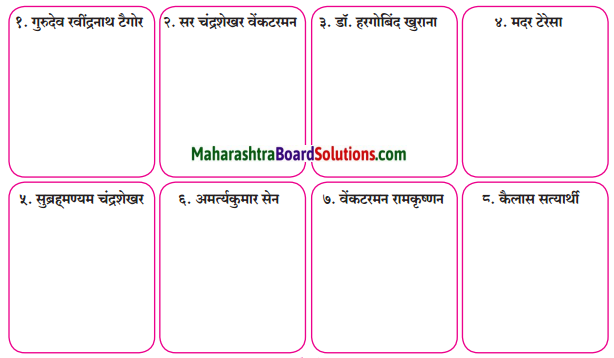
Answer:
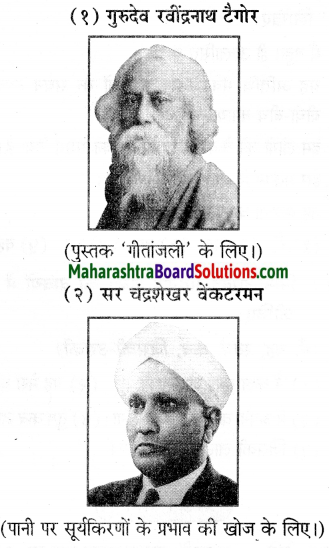
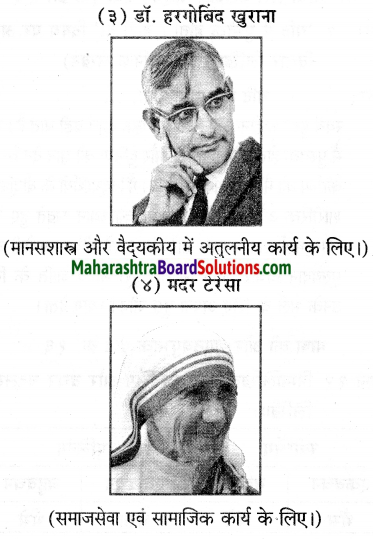
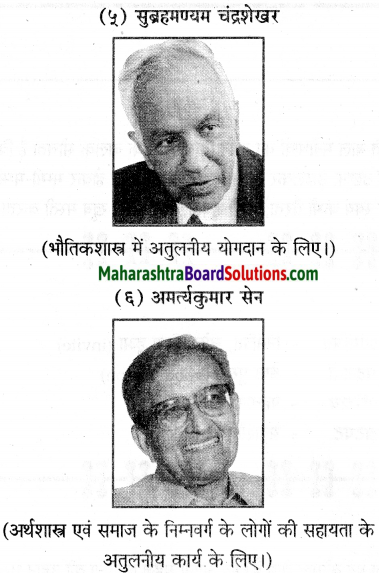
![]()
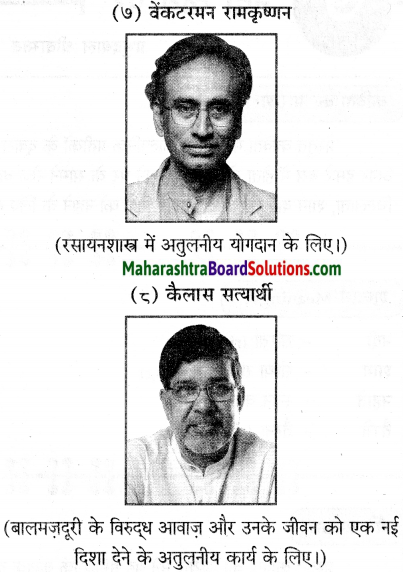
Hindi Sulabhbharti Class 6 Solutions Chapter 6 मेरा अहोभाग्य Additional Important Questions and Answers
निम्नलिखित शब्दों में से उचित शब्द चुनकर रिक्त स्थानों की पूर्ति कीजिए:
(बरामदा, धन्यवाद, ग्रामीण, मानसिक, गीतांजली)
Question 1.
गुरुदेव की प्रारंभिक कहानियों में ……………… जीवन के संसर्ग का वर्णन है।
Answer:
ग्रामीण
Question 2.
हम सबके लिए यह एक ……………… खाद्य था।
Answer:
मानसिक
Question 3.
हम सबने गुरुदेव को ……………… दिया।
Answer:
धन्यवाद
![]()
Question 4.
गुरुदेव को उनकी रचना ……………… के लिए नोबल पुरस्कार प्राप्त हुआ।
Answer:
गीतांजली
Question 5.
कमरे के बाहर एक विस्तृत ……………… था।
Answer:
बरामदा
निम्नलिखित वाक्य सही हैं या गलत लिखिए:
Question 1.
कार्यक्रम की अध्यक्षता लेखक करने वाले थे।
Answer:
गलत
Question 2.
मध्याह्न के बाद गुरुदेव की भेंट हुई।
Answer:
सही
Question 3.
गुरुदेव ने लगभग १० मिनट बात की।
Answer:
गलत
![]()
Question 4.
‘गीतांजली’ के लिए रवींद्रनाथ ठाकुर को भारत रत्न दिया गया।
Answer:
गलत
Question 5.
गुरुदेव की सेहत ठीक नहीं है – यह सुनकर लेखक को दुःख हुआ।
Answer:
सही
निम्नलिखित शब्दों का वाक्यों में प्रयोग कीजिए:
Question 1.
लोकप्रिय
Answer:
‘गोदान’ एक लोकप्रिय उपन्यास है।
Question 2.
उल्लास
Answer:
अपने सामने पुराने मित्र को अचानक खड़ा देखकर राम का मन उल्लास से भर गया।
Question 3.
दर्जन
Answer:
आज कल महँगाई के कारण ४० रुपये में केवल १ दर्जन केले ही आते हैं।
![]()
Question 4.
उपवन
Answer:
मेरे घर के सामने एक उपवन है।
Question 5.
प्रात:काल
Answer:
मैं प्रात:काल घूमने जाता हूँ।
Question 6.
निराश
Answer:
अपने मित्र की मृत्यु का समाचार सुनकर मोहन निराश हो गया।
निम्नलिखित प्रश्नों के उत्तर एक-एक वाक्य में लिखिए:
Question 1.
साहित्यिक कार्यक्रम कहाँ होने वाला था?
Answer:
साहित्यिक कार्यक्रम शांति निकेतन में होने वाला था।
Question 2.
गुरुदेव की कहानियों में कौन-सी मनोवृत्ति के दर्शन होते हैं?
Answer:
गुरुदेव की कहानियों में ग्रामीण जनता की मनोवृत्ति के दर्शन होते हैं।
Question 3.
संस्मरण में किस कहानी का उल्लेख किया गया है?
Answer:
संस्मरण में ‘काबुलीवाला’ कहानी का उल्लेख किया गया है।
![]()
Question 4.
लेखक आनंद विभोर क्यों हुए?
Answer:
लेखक आनंद विभोर इसलिए हुए क्योंकि लेखक जिस कमरे मे ठहरे थे, उसी कमरे में गुरुदेव रवींद्रनाथ ठाकुर ने ‘गीतांजली’ का अधिकांश भाग उसके बरामदे में लिखा था।
Question 5.
हिंदी वालों के दल को कहाँ ठहराया गया था?
Answer:
हिंदी वालों के दल को शांति निकेतन के सुंदर अतिथि-भवन में ठहराया गया था।
निम्नलिखित प्रश्नों के उत्तर दो-तीन वाक्यों में लिखिए:
Question 1.
दूसरे दिन लेखक और उनके दल को किस बात की जानकारी दी गई?
Answer:
दूसरे दिन लेखक और उनके दल को इस बात की जानकारी दी गई कि गुरुदेव का स्वास्थ्य ठीक न होने के कारण वे कार्यक्रम की बैठक में नहीं आ पाएँगे।
Question 2.
गुरुदेव की कहानियाँ संसार के किसी भी आदमी को क्यों भा सकती हैं?
Answer:
गुरुदेव की कहानियाँ संसार में किसी भी आदमी को इसलिए भा सकती हैं, क्योंकि मनुष्य-स्वभाव तो दुनिया में हर जगह एक सा ही होता है।
![]()
Question 3.
लेखक की खुशियों का ठिकाना क्यों न रहा?
Answer:
लेखक की खुशियों का ठिकाना इसलिए नहीं रहा क्योंकि जिस कमरे में लेखक ठहरे हुए थे, उसी कमरे में गुरुदेव काफी समय तक रह चुके थे।
व्याकरण और भाषाभ्यास
निम्नलिखित शब्दों का विलोम लिखिए:
- दिन
- जैसा
- जीवन
- छोटी
- सच
Answer:
- रात
- वैसा
- मरण
- बड़ी
- झूठ
![]()
निम्नलिखित शब्दों का वचन बदलिए:
- खुशी
- कहानी
- भाषा
- कल्पना
- मंज़िल
Answer:
- खुशियाँ
- कहानियाँ
- भाषाएँ
- कल्पनाएँ
- मंजिलें
निम्नलिखित बाक्यों में से सर्वनाम शब्द छाँटकर लिखिए:
- मैं बहुत ही उल्लासित था।
- यह अतिथि भवन अशोक वृक्षों के सघन उपवन के बीचो-बीच बनाया गया था।
- हम लोगों को केवल पंद्रह मिनटों का समय दिया है।
- इस मकान में जगह की भी कमी है।
- वह कहानी कल्पना की सृष्टि है।
Answer:
- मैं
- यह
- हम
- इस
- वह
![]()
निम्नलिखित सर्वनाम शब्दों का वाक्यों में प्रयोग कीजिए:
मैं, यह, स्वयं, कब, जिसकी-उसकी
Answer:
- मैं कल मुंबई जाऊँगा।
- यह मेरा घर है।
- मैं अपना काम स्वयं कर लूँगा।
- तुम कब जाओगे?
- जिसकी लाठी, उसकी भैंस।
